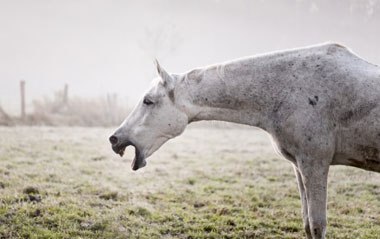Choke in Horses: What, Why, How
September 1, 2020

When you hear the word “choke” you may immediately think of the inability to breathe, like when a human is choking.
However, in horses, choke is a blockage of the esophagus, not a blockage of the airway. To understand choke and why it happens we first have to understand the parts of the equine digestive system and how they work.
The horse’s digestive tract
When horses eat, the feed first enters the mouth. The horse chews the feed to break it down into smaller pieces and saliva is produced to aid in swallowing. Once feed has been chewed, it enters the esophagus, a long tube of muscle, and travels to the stomach and small and large intestines for the digestive process.
The esophagus itself has wave-like muscular contractions that push food down the long pipe into the stomach. In horses, these contractions only travel in one direction (from mouth to stomach) which, coupled with the unique anatomy of the sphincter, or valve, that allows food into the stomach, keeps horses from being able to vomit.
Why does choke happen?
Choke in horses can occur for multiple reasons. If horses do not receive proper dental care, they will not be able to adequately break down feed in the mouth, and large chunks of swallowed feed could become stuck in the esophagus, creating an obstruction which will cause choke.
Further, if horses do not produce enough saliva or eat so quickly that there isn’t sufficient time for saliva to be incorporated into the feedstuff, there will not be proper lubrication for the food traveling down the esophagus.
Additionally, horses may choke if they are eating feedstuffs that are large and coarse, such as a low-quality hay, or feeds that expand greatly when exposed to moisture, such as beet pulp. The inability of horses to vomit makes it more difficult for them to clear any obstruction on their own.
What does choke look like?
Signs of choke will show up very quickly. Choke symptoms in horses include:
- Abruptly stopping eating
- Holding their head low towards the ground
- Excessive drooling, or discharge containing feed particles coming from their nose
- Shaking their head, coughing, or gagging
What can I do if my horse chokes?
If your horse chokes, there are some immediate actions to take. First, remove any hay and grain that is available to them, as they may attempt to continue eating and make the blockage worse. Call your vet as quickly as possible so they can treat your horse. Treatments may include sedation, providing medication to relax the muscles of the esophagus, or running a nasogastric tube.
In the long run, it is important to determine the reason that your horse choked and take preventative action to ensure it doesn’t happen again. In terms of feed for horses prone to choke, there’s a few proactive measures you can take.
First, soaking your horse’s feed in water prior to feeding can decrease the likelihood of choke, and aid in proper hydration. Giving your horse feed in a slow feeder or adding large rocks or balls to their feed to make obstacles they must eat around will slow down their eating and help prevent feed bolting. In the worst-case scenario, you may need to remove a specific feedstuff from their diet. Work with your vet to develop the best plan for your horse.
It’s important to remember that the horse evolved as a grazer and is not accustomed to eating “meals” as we tend to feed him. It is best to provide small meals more frequently throughout the day, which can aid in overall gut health as well as help prevent horse choke.
As always, be sure to provide continuous access to clean and fresh water, and make your horse’s gut health a top priority in your management program.
Read More:
- https://thehorse.com/13852/choke-esophageal-obstruction-3/
